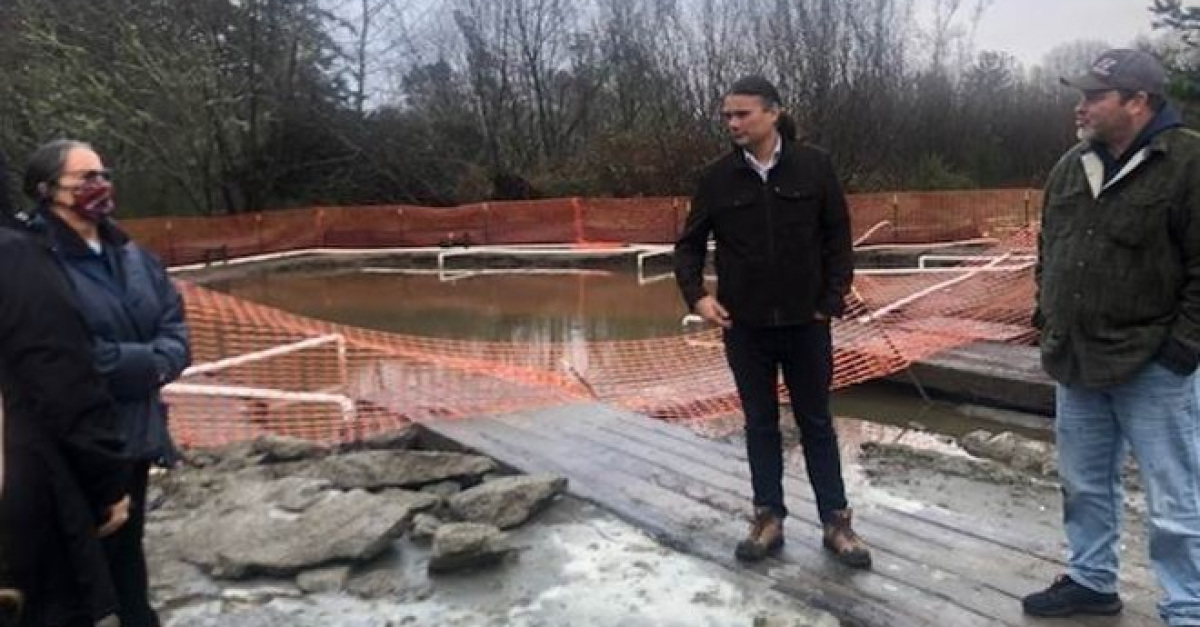
- Details
- By Native News Online Staff
U.S. Department of the Interior Assistant Secretary – Indian Affairs Bryan Newland visited several Washington states tribes in a three-day tour to tout the Bipartisan Infrastructure Law. While there he held listening sessions with tribal leaders to discuss their infrastructure needs.
While on tour, he saw first-hand the challenges coastal tribes are experiencing related to climate change, as well as ecosystem and infrastructure degradation.
Want more Native News? Get the free daily newsletter today.
Newland met with tribal leaders of the Shoalwater Bay Tribe, Jamestown S’Klallam Tribe, Port Gamble S’Klallam Tribe, Suquamish Indian Tribe, Puyallup Tribe and Muckleshoot Indian Tribe during his tour.
“As Indigenous coastal communities face the increasing threat of rising seas, coastal erosion and storm surges, our focus must be on bolstering climate resilience,” Assistant Secretary Newland said. “The funding in the Bipartisan Infrastructure Law is central to the Biden-Harris Administration’s all-of-government approach to building more resilient Tribal communities and protecting the natural environment.”
The good news is Newland was able to discuss the Bipartisan Infrastructure Law, the largest investment in physical and natural systems in the nation’s history, includes $466 million for Tribal climate resilience and infrastructure.
As the effects of climate change continue to intensify, Indigenous communities are facing unique climate-related challenges. Flooding, erosion, permafrost subsidence, sea level rise and storm surges are presenting existential threats to communities’ economies, infrastructure, livelihoods and health.
The infrastructure law also includes $2.5 billion to help the Interior Department fulfill settlements of Indian water rights claims. During the trip, Newland underscored the Department’s commitment to upholding the federal government’s trust responsibilities and delivering long-promised water resources to tribes, certainty to all their non-Indian neighbors and a solid foundation for future economic development for entire communities dependent on common water resources.
More Stories Like This
Native News Weekly (August 25, 2024): D.C. BriefsUS Presidents in Their Own Words Concerning American Indians
Native News Weekly (December 14, 2025): D.C. Briefs
Wounded Knee Massacre Site Protection Bill Passes Congress
Two Murdered on Colville Indian Reservation
Help us defend tribal sovereignty.
At Native News Online, our mission is rooted in telling the stories that strengthen sovereignty and uplift Indigenous voices — not just at year’s end, but every single day.
Because of your generosity last year, we were able to keep our reporters on the ground in tribal communities, at national gatherings and in the halls of Congress — covering the issues that matter most to Indian Country: sovereignty, culture, education, health and economic opportunity.
That support sustained us through a tough year in 2025. Now, as we look to the year ahead, we need your help right now to ensure warrior journalism remains strong — reporting that defends tribal sovereignty, amplifies Native truth, and holds power accountable.
 The stakes couldn't be higher. Your support keeps Native voices heard, Native stories told and Native sovereignty defended.
The stakes couldn't be higher. Your support keeps Native voices heard, Native stories told and Native sovereignty defended.
Stand with Warrior Journalism today.
Levi Rickert (Potawatomi), Editor & Publisher

